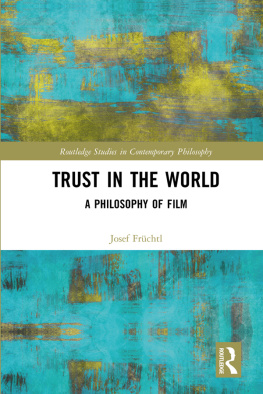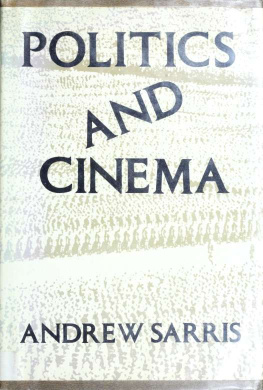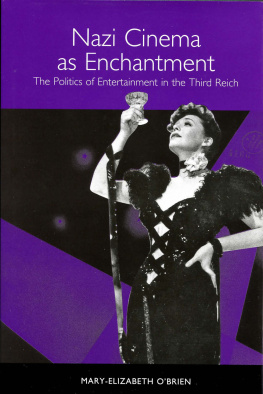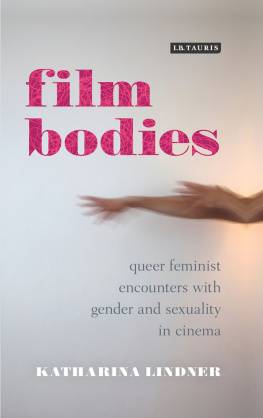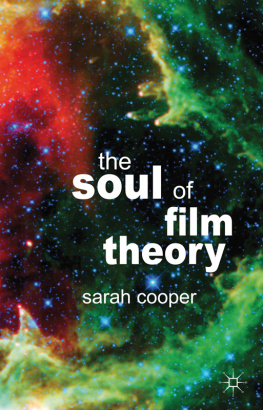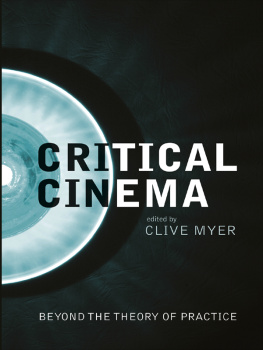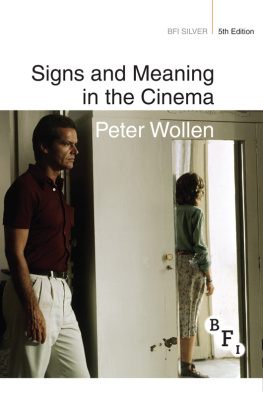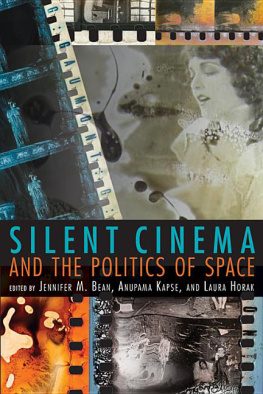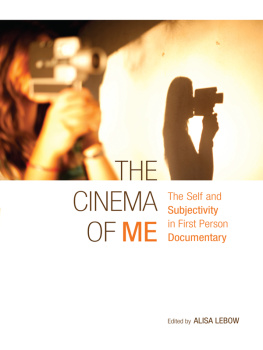Trust in the World
A fascinating and philosophically provocative exploration of cinemas power to restore belief in the world, focusing not only on Deleuzes account of modern cinema but drawing on Nancy and Cavell as well.
Robert Sinnerbrink, Macquarie University, Australia
This book examines the theory, originally raised in Gilles Deleuzes philosophy of film, that cinema has the power to restore our trust in the world. Frchtl demonstrates that cinema does this in three main ways: by restoring our belief in the absurd, in the body and in a sceptical abstention from judging and acting. Cinema shares this ability with other arts, but what sets it apart in particular is that it evokes Modernity and its principle of subjectivity. This book further develops the idea of trust and cinema by synthesizing the philosophies of complementary thinkers such as Kant, Nancy, Agamben, Benjamin and Rancire. It concludes with examination of Cavells solution to the problem of scepticism and a synthesis of Kantian-aesthetic theory with Cavellian pragmatism. Originally published in German under the title Vertrauen in die Welt, this English-language translation features a new introduction that situates Frchtls work within contemporary analytical philosophy of film. It will be of interest to scholars working in continental aesthetics, philosophy of film and film theory.
Josef Frchtl is Professor of Philosophy of Art and Culture at the University of Amsterdam, the Netherlands. His major research interests are aesthetics, especially the relationship between aesthetics and ethics, theories of Modernity, critical theory and the philosophy of film. He is the author of The Impertinent Self: A Heroic History of Modernity (2009).
Routledge Studies in Contemporary Philosophy
For a full list of titles in this series, please visit www.routledge.com
87Facts and Values
The Ethics and Metaphysics of Normativity
Edited by Giancarlo Marchetti and Sarin Marchetti
88Aesthetic Disinterestedness
Art, Experience, and the Self
Thomas Hilgers
89The Social Contexts of Intellectual Virtue
Knowledge as a Team Achievement
Adam Green
90Reflective Equilibrium and the Principles of Logical Analysis
Understanding the Laws of Logic
Jaroslav Peregrin and Vladimr Svoboda
91Philosophical and Scientific Perspectives on Downward Causation
Edited by Michele Paolini Paoletti and Francesco Orilia
92Using Words and Things
Language and Philosophy of Technology
Mark Coeckelbergh
93Rethinking Punishment in the Era of Mass Incarceration
Edited by Chris W. Surprenant
94Isnt That Clever
A Philosophical Account of Humor and Comedy
Steven Gimbel
95Trust in the World
A Philosophy of Film
Josef Frchtl
Trust in the World
A Philosophy of Film
Josef Frchtl
Translated by Sarah L. Kirkby

First published 2018
by Routledge
711 Third Avenue, New York, NY 10017
and by Routledge
2 Park Square, Milton Park, Abingdon, Oxon OX14 4RN
Routledge is an imprint of the Taylor & Francis Group, an informa business
Vertrauen in die Welt Wilhelm Fink GmbH & Co. KG, Paderborn 2013 All rights reserved by and controlled through Wilhelm Fink GmbH & Co. KG, Paderborn
This translation 2018 Taylor & Francis
The right of Josef Frchtl to be identified as author of this work has been asserted by him in accordance with sections 77 and 78 of the Copyright, Designs and Patents Act 1988.
All rights reserved. No part of this book may be reprinted or reproduced or utilised in any form or by any electronic, mechanical, or other means, now known or hereafter invented, including photocopying and recording, or in any information storage or retrieval system, without permission in writing from the publishers.
Trademark notice: Product or corporate names may be trademarks or registered trademarks, and are used only for identification and explanation without intent to infringe.
Library of Congress Cataloging-in-Publication Data
A catalog record for this book has been requested
ISBN: 978-1-138-70878-5 (hbk)
ISBN: 978-1-315-20114-6 (ebk)
Typeset in Sabon
by Apex CoVantage, LLC
Contents
This book in its original German version was written in Amsterdam between 2007 and 2012. The English edition has been slightly modified and includes some additional passages, most prominently a new .
The book is based around lectures of mine, some of which I have used as the basis for discussions on several occasions. I would like to thank Gertrud Koch and Christiane Voss for inviting me to a workshop in Berlin, Karen van den Berg and Hans Ulrich Gumbrecht for inviting me to a workshop in Friedrichshafen on the shores of beautiful Lake Constance, Ludger Schwarte for inviting me to the National Center of Competence in Research Iconic Criticism in Basel (Eikones), and Kati Rttger for the great honour of an invitation to a keynote lecture at the major congress Orbis Pictus Theatrum Mundi in Amsterdam. I would also like to thank Anneka Esch-van Kan, Stephan Packard and Philipp Schulte, who organised an outstanding congress in Giessen on Thinking-Resisting-Reading the Political, and Markus Gabriel, who brought together philosophers from Germany and the USA in Bonn to discuss Philosophy, Film and Scepticism. I especially owe thanks to the Internationales Kolleg fr Kulturtechnikforschung und Medienphilosophie in Weimar, where I was permitted to spend a glorious summer as a fellow and, not least thanks to Lorenz Engell, to become acquainted with the intellectual eloquence of exuberance. If the Protestant and early capitalist saying that the devil finds works for idle hands were still to hold true, then this period of my life, despite also retaining my position as head of the Department of Philosophy at the University of Amsterdam, would be seen as extremely productive, with almost exemplary idle hands being found much work. Nevertheless, all the conferences I attended made me very aware of what scientific discourse can be serious and yet jolly, full of conviction and yet relaxed. Responsibility for the ensuing publication is, of course, solely my own.
Some of the chapters in this book are published in preliminary and usually heavily abridged English versions: : Trust in the World. Going to the Movies with Cavell, Wittgenstein, and Some Prior Philosophers, in: Stefan Majetschak & Anja Weiberg (eds.): Aesthetics Today: Contemporary Approaches to the Aesthetics of Nature and of Art, Contributions to the 39th International Wittgenstein-Symposium, Berlin: De Gruyter 2017.
Revised for the English Translation Edition
Blow Up, the film by Michelangelo Antonioni, ends with a puzzling, dreamlike scene. After the protagonist has tried for quite a long time, in fact what is for him (a young, bored, yet artistically ambitious fashion photographer) a very long time, namely a whole day, to solve what seems to be a murder casein the background of an enlargement, a blowup, of a photo he has happened to take of a pair of lovers in a park, he discovers a figure with a pistol next to a body, which is still lying there when he runs back to the place in question, although it disappears later on, as he is to realiseafter he has tried in vain to solve the puzzle, then, he meets in the park a group of young people, all dressed as clowns, the same group he had met the day before at the beginning of the film, on a car journey through London. Two of the clowns are playing tennis, or at least are pretending to play. The others are watching, or at least are pretending to watch, turning their heads to the left, and then to the right, looking straight ahead for a (pretend) serve. The astonishing thing when you watch this film is that, although no ball can be seen flying backwards and forwards, a ball can be heard. When, during the pretend match, the ball flies out of the tennis court and lands near the photographer, they all turn to stare at him until, eventually, one of them gestures with his head as if to say, Go on! Throw the ball back into the court, theres a good fellow. The young man hesitates at first, irritated, but then does what is expected of him and makes a pretend effort to throw the non-existent ball back. He smiles, picks up his camera, his instrument of observation, from where he had laid it on the grass and walks away. Meanwhile the cinema camera adopts a birds eye view, distances itself and freezes.

